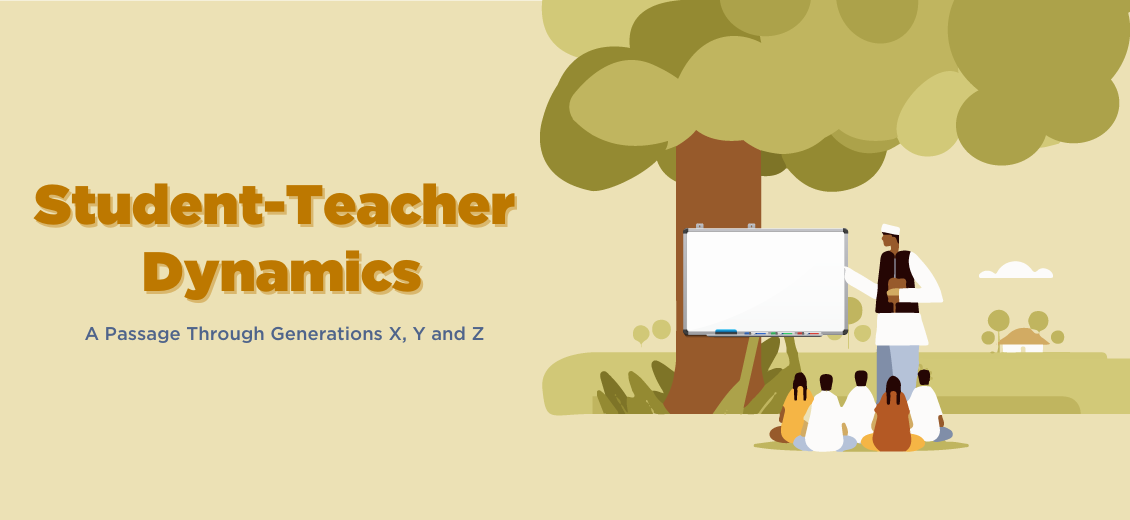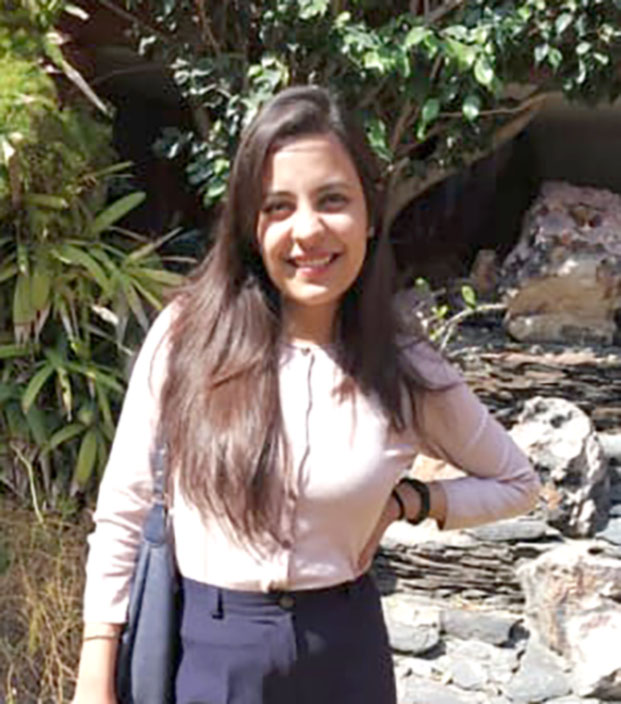Student-Teacher Dynamics: A Passage Through Generations X, Y and Z
Blogs Home
- 09 Sep 2022

We have all heard our parents’ anecdotes about their relationships with their teachers, followed by a sigh, exclaiming how everything has changed today. It often sounds something like this "In our times, teachers used to be strict, we used to be disciplined to avoid punishment, and we are grateful to them, regardless of everything". There's no doubt that the student-teacher relationship has evolved over generations. If we try to sketch this evolution from Generation X to Generation Y, followed by Generation Z and consider a comparative analysis of the change in student-teacher relationships, we will realise that the change over time is startling.
The Guru-Shishya dynamics
Indian culture has emphasised the importance and respect given to a guru. The relationship between Guru-Shishya has been considered sacred and valuable right from the Vedic era. The Sanskrit term "Guru" means the person who guides one from the path of darkness to light, while Shishya means a seeker of truth and knowledge. We have heard the story of Eklavya, who without a moment of hesitation, cut his thumb and offered to Guru Dronacharya as Guru Dakshina. This was an age where teachers (Gurus) were feared, honoured and respected. The parents had complete faith in the Gurus and a thirst for seeking knowledge was encouraged.
Gen-X
It is only natural that different generations have different experiences, and like all social relationships, the equation between students and teachers continues to change. Generation X, as coined by Robert Capa, a war photographer, meaning those who are born between 1965 and 1981, have had altogether different experiences from those who are either from Generation Y or Generation Z. Most of the Indian parents of young adults, between the age of 41-55, comprise the Generation X category when loosely defined.
My parents, for example, often reiterate that while their teachers used to be stricter and often used harsher punishments to discipline them "in their times", students had respect for their teachers, regardless. Most of the students of this era studied in government schools, largely because of the socio-economic conditions of people, and partly because there were fewer private schools.
The Millennials (Gen Y)
With the rapid advent of technology, the coming of the internet, and the invention of computers, Generation Y came to be known as Digital Natives. Also known as Millennials, this generation was beginning to be exposed to new technological developments and a rapidly changing social system. And thus, changed the dynamics of students’ relationships with their teachers.
The zeal for innovation and the enthusiasm to adapt to new developments among students demanded a change in instructing methods on the teachers' part. The chalk and talk, although a classic method of teaching, lost its essence. While the previous generations could manage to find jobs with basic qualifications, it was important for the new youth to learn new skills and adapt to a changing job environment. This made it necessary for educators to realise that the demands of the world have changed and that they need to introduce modern techniques in their teaching methods as well.
Ushering of Gen-Z
The recent group that comprises the category of students, aged between ten years to twenty-six years old, is Generation Z. This generation, with the oldest born in 1995 and the youngest in 2010, was born in an environment of tablets and smartphones. This generation, in particular, has been the one most influenced by the "Internet". Naturally, it has influenced education as well. Usually, it has been noticed that they have a short attention span, as a result of trying to meet the needs of multitasking. The remarkable trait of this generation is that they are independent and wish to be self-reliant.
Technological challenges
The age of the internet has undoubtedly altered the relationship between teachers and students. There is easy access to information and an enthusiastic learner can learn anything, at any time. The ed-tech industry has further changed the picture by shifting from a classroom model to an online education one. There are various platforms, with experienced teachers, offering a variety of courses and video lessons and a learner with massive potential can employ the facility of the internet to acquire new knowledge. However, there are some drawbacks to it. There is an ocean of information available, flooding the student with ample sources but this can be problematic when the information is not translated into usable knowledge.
Here, the position of the teacher has been transformed. It is not enough to lecture and exit the classroom, but also to act as a facilitator. Today, a teacher's role is not limited to imparting classroom learning, it also includes assisting as a counsellor and being a mediator. With the evolving education system, and the altered needs of students, teachers have also adapted and enhanced themselves as content specialists.
The usage of the word "teacher" primarily means only an educator. But nowadays a teacher is also a resource provider, mentor, guide and classroom supporter. Beyond fulfilling traditional responsibilities, they exercise considerable influence on a student's life and personality. As agents of socialisation, teachers can stimulate healthy relationships and lay a bed of principles which can affect the growth of an individual's personality.
The changes in recent decades have changed the dynamics of the bond between the student and teacher, as well as the education system. It has turned into a holistic role, where the teacher has to ensure their students’ growth in an all-around way. Support on the part of teachers is believed to facilitate students' growth dynamically. It is true that educators have immense power and can ensure the growth of future generations by nurturing their minds with valuable knowledge and by developing the ability among them to turn knowledge into wisdom.
On the part of students, the respect for mentors has somewhat diminished. The backbencher attitude has become the new cool, which is unfortunate. Peer pressure plays a huge role here. The ones who hold respect for teachers are often mocked as either nerds or teachers' sycophants. This is especially true in the cases of senior-secondary classes where a lack of sincerity (in adolescence) can divert the pupil.
On the other hand, teachers also need to acknowledge the need for changing times and be willing to learn about a child's personality and difficulties. It should be mentioned that modern times have eroded the value given by a teacher to their task. Some consider it barely a profession, trying to complete their task of ending the syllabus and ticking off the list of things they need to do. Such behaviour, on part of teachers, is possibly a consequence of many factors. For instance, low salaries or lack of job security, or behaviour of higher authorities in schools can contribute to the ‘detachment’ experienced by teachers. However, these are only speculated reasons, and this analysis needs further research.
In every generation, there are some flaws in social relationships. That is only natural. But it is important to reflect on these weaknesses and search for the causes of such changing dynamics. However, that alone will not be enough. One has to go beyond and look for possible solutions to correct any faults. This will demand an analysis of the behaviour of students as well as teachers.
Regardless of some bumps in this road, one cannot ever completely refute that the student-teacher connection is one of the most significant relationships that can influence an individual's life. While it is reasonable that harsher punishments experienced by the previous generations have been done away with, for a variety of acceptable reasons, and only for the good, it is also to be noted that something has slipped away from the minds of today's generation and that, I believe, is showing ‘respect’.
Nevertheless, it does not mean that the future is entirely bleak. The student-teacher relationship can be nurtured and strengthened with patience and with practising inclusivity.
If the realities of the changing world, which is flooded with information and new technologies, are well-understood and analysed, one can say that the new age can lead to a new understanding between the educator and the learner.

Annie Pruthi
Annie Pruthi is pursuing her masters in Political Science from JMI, New Delhi and is a 1st division Arts graduate from Gargi College, DU. She is an avid reader and an award-winning author.
Blogs Home



